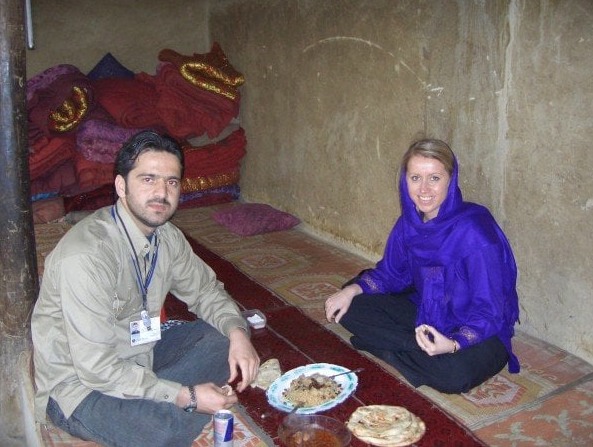Local woman ‘shepherds’ Afghani escapees
Maddy Harker
02 October 2021, 10:06 PM

A Wānaka woman who has acted as a ‘shepherd’ in international efforts to evacuate vulnerable people from Afghanistan over the past fortnight is reeling from the experience.
Emma Conyngham lived in Afghanistan for about three years in the early 2000s, and her connection with the place and its people drew her into the evacuation efforts as the US withdrew from the country.
After connecting with a former workmate who works at USAID (United States Agency for International Development), Emma became a ‘shepherd’ - part of a movement supporters are calling ‘Digital Dunkirk’ - as one of many private citizens helping assist with evacuations from great distances, with the help of defence forces, on-the-ground connections and digital communication.
Emma said it was a sort of “Chinese whispers” communication style, with commandos and defence force staff pinning maps and developing coordinates and people like Emma communicating that information with families on the ground and trying to help them reach the airport.
It also included “an enormous amount” of paperwork, trying to file visa applications for Afghans and work through the bureaucracy and logistics required.
It’s far too hard to estimate how many people were helped by her efforts, Emma said.
“There were some people we shepherded just from one point to another; for some I did the case files; some of them were being shepherded along with much larger groups.”
And where many of those people ended is unclear: “Even now people’s phones have died and we think they got on the planes but we don’t know.”

Emma lived in Afghanistan in the early 2000s.
With the US withdrawal and the Taliban takeover now complete, Emma says she is struggling to adjust to normal life after weeks of high stress and little sleep assisting agencies.
Emma has a business called Waste Free Celebrations, which sells reusable gift wrapping, and she says it’s “hard to think about ribbons and fabric when my reality is at the most diametrically opposed end.”
Her mind is still on three families in particular, personal friends, who could not be evacuated from Kabul Airport and are still living in extreme danger.
They are among the 60,000-odd people who were unable to escape before the US forces retreated.
There are 17 people among the three families that Emma is still working to help.
“Their mother was killed by the Taliban, and their father has always been outspoken about the Taliban,” Emma said. “They can’t work or leave their houses and there’s only one family member from the whole group who is unrecognisable [to the Taliban] and they can move around.”
Emma is raising money to help support them with safe housing and medical supplies, and to support Operation Recovery, a multi-agency effort to repatriate US citizens and Afghan allies who are still stuck in Afghanistan.
There’s one person who made it out with Emma’s help who has recently arrived in New Zealand and hopes to meet her when travel around the country is permitted.
‘Miriam’ (a pseudonym), is the sister of someone who was formerly on Emma’s sewing team.
She had been a senior prosecutor for the attorney general’s office in Kabul and therefore had a “huge” target on her back, Emma said.
After securing a temporary NZ visa, Miriam was evacuated from Afghanistan by the New Zealand Defence Force with assistance from Emma and other shepherds.
Many of the details of the rescue cannot be shared because of privacy concerns, Emma said, but “shepherding Miriam was a 48 hour operation with no sleep”. Emma had to make split second decisions, including advising Miriam on behalf of the defence force to re-enter Taliban controlled areas while the sound of gunfire rang out.
“When [she finally got through] we were all cheering,” Emma said. “We [the operations team and Emma] all felt really chuffed when we managed to get her and her husband and three kids out.
“That whole process from start to finish was momentous.”
Emma held communications and media roles with the United Nations and other agencies when she lived in Afghanistan, and said she’s remained connected to the country and the people she met during her time there.
“I think I was there in a golden period,” Emma said. “After 9/11 the Taliban took off for a while [and] people were so happy to have foreigners there willing to help.”
Support Emma’s fundraising efforts for the families in Afghanistan with a donation to Left Behind ‘06 0145 0328701 01’ or visit the Waste Free Celebrations Facebook page for details of products available for purchase with 100 per cent of profits going to the Afghan cause.
PHOTOS: Supplied

